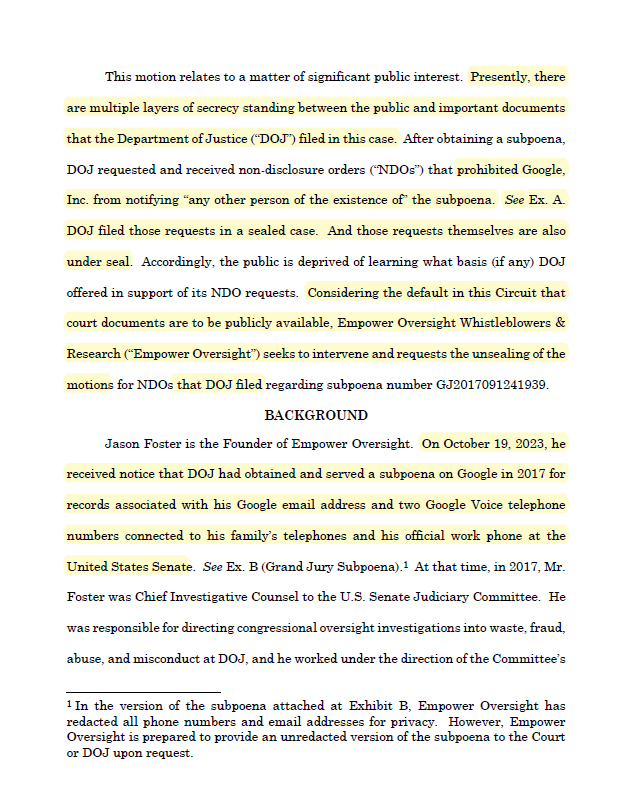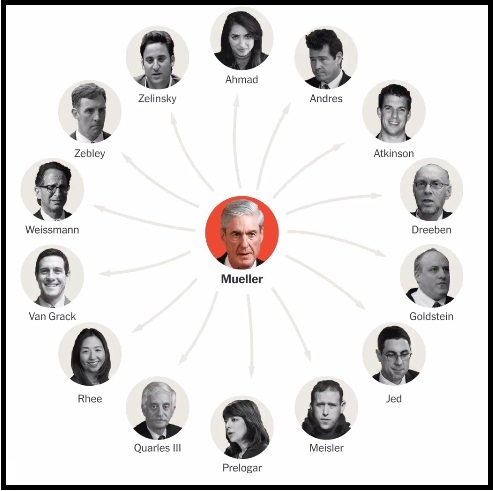Jason Foster has filed an interesting “motion to intervene” in a court filing against the DOJ effort to keep the legal rationale for a 2017 subpoena hidden. tldr version HERE
Mr. Jason Foster was one of Chuck Grassley’s congressional lawyers on the Senate Judiciary Committee, and a key Grassley research staffer when the background of the DOJ/FBI Spygate operation against Donald Trump was at its apex.
In a COURT FILING, Jason Foster notes, in September 2017, the DOJ requested and received a court order which it leveraged against Google and Big Tech to gain access to the phone and electronic data of House and Senate staff members. The DOJ then filed Non Disclosure Orders (NDOs) blocking the notification of the target(s), in this example Mr. Foster himself. Foster wants to know what justification the DOJ gave the judge to get the warrants and subpoena.
I find this motion/filing exceptionally interesting, because the originating DOJ action was in September ’17, when the Mueller cover-up was in full bloom; the Mueller team essentially controlled all of Main Justice (per Rosenstein testimony), and the effort of the DOJ was to keep a bag over the FBI/DOJ activity in the 2016 election.
As Jeff Carlson notes, the “DOJ has kept sealed their “legal rationale” for targeting the communications of congressional staff attorneys for GOP oversight committees.”
Foster notes, this DOJ subpoena appears related to the leak of the “Top Secret” FISA application used against Carter Page. The media received that leak, in March 2017, and the FBI (Washington Field Office) was investigating how the TS-SCI classified leak originated. At the same time, the DOJ (“Mueller team”), now in September 2017, had a vested interest monitoring ‘who knew what’ not only about the leak (James Wolfe and Mark Warner), but also about the motives of the special counsel coverup operation.
In the filing, Empower Oversight writes:
“At the time DOJ began collecting their communications records, Mr. Foster and his fellow colleagues on both sides of the aisle were communicating with confidential sources and whistleblowers whose willingness to share information with Congress is essential to its oversight function. The Legislative Branch has a constitutional interest in protecting the identity of those confidential sources and whistleblower just as journalists do under the First Amendment. Yet due to the secrecy demanded by DOJ, and granted ex parte by the Court, the nondisclosure orders deprived Congress of an opportunity to object at the time or even to know until years later that telecommunications providers had complied. Providers like Google, and perhaps even the Court, yielded to DOJ demands for secrecy without knowing the full context and constitutional implications of the subpoenas.” (more)
The Mark Warner and James Wolfe leak of the FISA application to media was one of the biggest untold stories of the 2017 Trump targeting and DC coverup operation. Factually, the media had the full and unredacted FISA application from March 17, 2017, throughout all of their pretense reporting, as if they didn’t know the details.
The greatest likelihood is that Mueller’s team, headed by Andrew Weissmann, wanted to keep tabs on who in Washington DC was circling the truth. The subpoena against Jason Foster and other House and Senate committee lawyers and staff would help the DOJ keep tabs on who knew the details at a very key time in the coverup operation.
Within Main Justice, DOJ at the time Andrew Weissmann (Mueller team) would want to know what Chuck Grassley and Devin Nunes had uncovered, and who would potentially be assisting them.
The DOJ search warrants, in Sept 2017 (the warrants of interest to Jason Foster), likely do not relate directly to the James Wolfe investigation, despite the timeline being very similar. U.S. Attorney Jessie Liu, from the USAO in Washington DC, was conducting the Wolfe investigation, and the Washington Field Office (WFO), FBI Agent Brian Dugan was the lead investigative unit. These subpoenas were something else.


FILTHY LIBERALS.
Shovel needs to meat face. Can’t say much more without see eye eh flagging it.
I ‘m just seeing more of the same, its all smoke and mirrors. Tons of “inquiries”, “hearings”, nothing has happened, nothing is happening and I’m starting to believe, as usual, nothing is going to happen. EVERYONE will walk.
Jim Jordan and so many others i thought could/would do something, every single one of them is useless and full of hot air. Same as it ever was…
A people united under the identity of human beings with God given American freedom is pretty much the only collective action that can successfully impede this small segment of pure evil.
Wow. Just wow.
This is so bad. You still have looney liberals out there screaming Trump Russia all the while the crooked bas tards were trying to see what the investigators were doing.
The minute the “news” came out about the peepee tape, I KNEW it was all BS. Ever hear of corporate espionage? Trump was there on business. The Russians would have LOVED to put him in a room with cameras and mikes planted all over the place. The KGB did it to their own citizens, for YEARS!!!
Only the people operating with maybe 2 brains cells would make the assumption that Trump would be blissfully unaware of the fact that the Russians would LOVE to know Trumps negotiating plans for what ever he was going to do there.
The whole attempt, this whole “dossier” business, saddens me to think that ADULTS, making decisions on our collective health and safety, would do something that, again, IMHO, would be similar to what grade school children would do. How sick sad and disgusting all of this is. Our “government” is filled with liars, thieves, mentally ill people. We’re really in big trouble.
And don’t get me started on the ‘rona and the poison they wanted to fill everyone up with.
Among other things, a violation of the separation of powers
Which court?
Who was the judge?
District court DC…..
Robin M. Meriweather
U.S. Magistrate Judge
U.S . D1stnct and Bankruptcy Courts
for the District of Columbia
seems that multiple judges of this court signed orders to seal…..
Is this a routine signofff going on here? Human rubber stamps?
Need military style summary court justice for these and others who have George Washington style justice justice due.
Go with a drumhead trial.
And no doubt this was not part of the Durham investigation purview.
The most troubling is that this is the DOJ spying on those who had oversight over the DOJ. There must be something unethical and/or illegal about that abuse. Whoever approved this should be held accountable (fired or indicted, etc).
The Mueller investigation needs to be exposed for what it was.
b@st@rds !!!!!
People have done truly vile things.
No one has paid for their vile deeds.
There was a time when Congress jealously guarded itself against intrusions by the executive branch. A Democrat member of Congress was implicated in a truly sordid – and breathtakingly artless – bribery scheme. The sort of thing even Hunter Biden would know better than to do, even dumber than Duke Cunningham’s kickback scheme. The FBI raided the Congressman’s Capitol Hill office and the Republican leadership at the time raised holy hell about this breach of Congressional privilege.
Now, the DOJ openly acts like the East German Stasi, spying on members of Congress for nakedly political purposes without any legitimate law enforcement reason, and Congressional leadership just shrugs.
The corruption is real, deep, and cancerous.
Incredibly we have Congress funding the DOJ to its fullest in every budget that enables this behavior. The power of the purse seems to only be wielded when Democrats control the House.
Spying on congress is, or at least should be, a big deal. Spying on everybody, even his own party, everybody on K street, SCOTUS, etc., by Obama is pretty obvious now. There was a ton of spying/arm twisting going on during the passage Obamacare, to be sure. It even makes me wonder if the WH communications agency was taping the green phones.
Are there any honest government workers in the DoJ,CIA, NSA, IRS, Biden’s administration, et al? If so, why have none come forward to expose the corruption and perfidy of these agencies? We need to do what Reagan did to the FAA Controllers who did not want to work. Fire them all and start over with fewer workers and no Civil Service protection. We have nothing good to show from any of these agencies since Reagan’s era. They don’t protect us, they don’t provide any useful service, and they have destroyed our trust and faith in our government. Shame on everyone who works for them.
Shame on us for allowing it.
You get more of whatever you tolerate.
We seem to have everything we need in 18 USC 242, the Declaration of Independence and the Bill of Rights. Except the Will and Courage.
Every single one of these USG employees committed treason against the United States.
Their actions under the color of official conduct is as bad as if they personally helped an invading foreign army take over the White House from the American people.
Arrest, try, convict, and then to the wall. Just like French PM Pierre Laval in 1946.
Let God be the one to show them mercy, for this Nation will not.